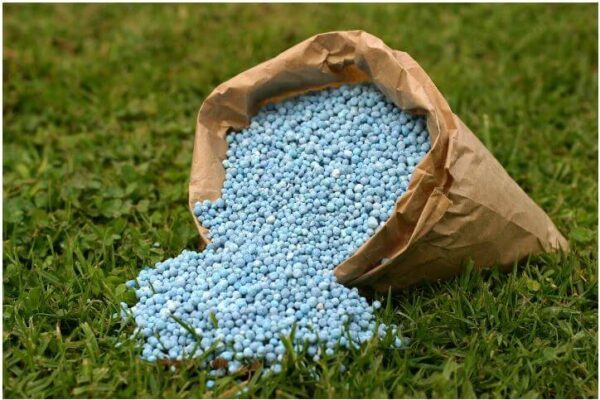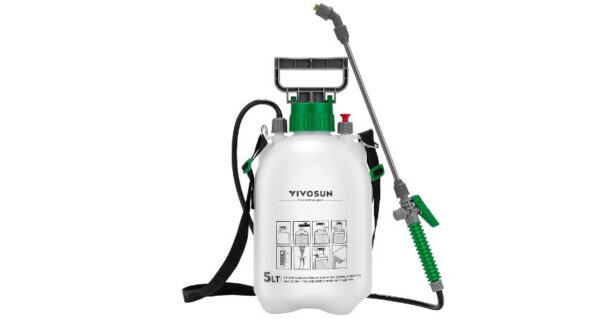The question of whether lawn fertilizers kill weeds is not new. This is a concern that many farmers have had for as long as commercial-grade fertilizers have existed. So, let’s find the answer to the question, does fertilizer kill weeds? Or better still, what does fertilizer do to the grass?
On its own, fertilizer does not kill weeds because most weeds thrive on low-nitrogen soils. When you apply nitrogen-rich fertilizer on your grass, which most gardeners do, you make the soil less conducive for the weeds to thrive.
Why Doesn’t Fertilizer Kill Weeds?

Weeds cannot grow on a well-manicured lawn. Weeds love a place where the gardener has failed to do its job – caring for his/her lawn. Although some weeds are, stubborn-they can invade even the highly manicured lawn; chances are they will soon disappear with the application of the best weed killers.
However, this article is for you if you need help with stubborn weeds on your lawn. In it, I will discuss how you will permanently eliminate weeds from your lawn.
Why Do Weeds Grow So Fast?
Like other plants, weeds fight to get the best food from the soil. As mentioned earlier, weeds will always be your biggest enemy if you do not tend your lawn. They will invade your grass and compete for the food meant to enrich it.
Whether you clean your garden or not, you will realize that weed seeds will be in the soil already. The seeds can lie dormant in the soil for many months, even years, until the right time to sprout. When the right time comes (after you prepare the soil to plant your grass seed), they pop up fast, leaving your grass behind.
What are the common types of weeds that thrive in your area? I have sampled some of the common weeds found in different states. You can check which weeds are common in your state.
The Best Way to Kill Weeds on Your Lawn
Most lawn weeds thrive in soils that have low nitrogen content. However, you need to apply nitrogen-rich fertilizer to grow thicker and fuller grass. Therefore, by using nitrogen-rich fertilizer, you will be making the soil less hospitable for most weeds.
So, the first way to quickly kill weeds in your lawn is to use commercial-grade nitrogen-rich fertilizers. If you are wondering which fertilizers you should buy, I have made it easier for you.
Here are the top 10 best nitrogen-rich fertilizers for lawns you can try;
- Jonathan Green Winter Survival Fall Lawn Food
- Miracle-Gro Water Soluble Lawn Food
- Pennington UltraGreen Starter Lawn Fertilizer
- Scotts Natural Lawn Food
- Milorganite All-Purpose Eco-Friendly Slow-Release Fertilizer
- GreenView Lawn Food
However, it would help if you exercised caution because overapplying nitrogen-rich fertilizer on your lawn can make the soil toxic.
The second way to deal with weed infestation is by using the natural and organic route.
How to Kill Weeds in Your Garden Using Natural & Organic Weed Killers
If you are not careful, store-bought commercial-grade weed killers can ruin your garden. Surprisingly, natural and organic remedies deliver good results without causing significant harm to your garden. Besides, these natural and organic weed-killing methods improve soil quality.
So, before you go for commercial-grade weed killers, why not try natural and organic ones?
Here are some of the natural and organic weed killers you can try;
Salt – salt is one of the most effective home remedies that kill weeds fast. When poured on the ground, table salt removes oxygen from the soil, leaving the weeds to suffocate. However, be careful not to pour the salt directly onto the grass.
Hot water – pour hot water directly into the weeds to kill them but be careful not to direct the boiling water to your grass.
Lemon and vinegar – add 4 ounces of lemon juice to a quart of vinegar to make a weed killer. Spray the mixture directly onto the weeds using a spray bottle or pressure pump sprayer (pictured below). The concoction will make the weeds dry up and eventually die.

Use baking soda and Epsom salt – farmers have used the combination of baking soda and Epsom salt to kill weeds for many years. Spray this mixture directly to the weeds; they will die within a few days. Learn how to spray Epsom salt on grass the correct way.
Dish soap, vinegar, and salt – Dawn dish soap and vinegar are among the best natural home remedies for killing weeds. Making this weed killer is simple. Mix a gallon of white vinegar, one tablespoon of dish soap, and a cup of salt in a spray bottle. Shake to mix well before spraying it directly into the weeds.
Related: Does Soapy Water Kill Lawn Fungus?
Clove oil and water – you can kill young and fresh weeds by spraying them with a few drops of clove oil and water.
Coca-Cola – although friendly and fit for human consumption, Coca-Cola is acidic and can kill lawn weeds. To kill lawn weeds, pour coca cola directly into them, and you’ll see them die.
Rubbing alcohol and water – mix a quart of rubbing alcohol with some water and pour the mixture directly onto the weeds to kill them.
Straw – when people talk about straw, they only say how it adds organic manure to the soil. However, did you know that laying a thick straw over weeds can suffocate them as they decompose into the soil?
Does Fertilizer Kill Weeds? Frequently Asked Questions (FAQs)
Q: What kills weeds the best?
A: The number one weed killer for lawns is Spectracide Weed and Grass Killer Concentrate.
Q: How do you permanently kill weeds in soil?
A: You can permanently kill weeds in soil by combining dish soap, vinegar, and salt and spraying the mixture directly onto the weeds.
Q: What kills weeds the fastest?
A: Acetic acid is by far the fastest weed killer. But it would help if you were careful, for it will also kill any other plant it comes into contact with.
What Now?
Does fertilizer kill weeds? On its own, fertilizer cannot kill weeds. This is because most lawn weeds do well in soils with low nitrogen levels. A well-maintained lawn must have nitrogen, a crucial ingredient for healthy lawns.
However, you can try natural and organic weed killers that do not harm the soil. Some natural and organic methods you can try include salt, a mixture of baking soda, vinegar, coca cola, straw, lemon and vinegar, clove oil and water, and even hot water.


